
The Gospel of Matthew is the first book of the New Testament of the Bible and one of the three synoptic Gospels. It tells how Israel's Messiah, Jesus, comes to his people but is rejected by them and how, after his resurrection, he sends the disciples to the gentiles instead. Matthew wishes to emphasize that the Jewish tradition should not be lost in a church that was increasingly becoming gentile. The gospel reflects the struggles and conflicts between the evangelist's community and the other Jews, particularly with its sharp criticism of the scribes and Pharisees with the position that through their rejection of Christ, the Kingdom of God has been taken away from them and given instead to the church.

The Wandering Jew is a mythical immortal man whose legend began to spread in Europe in the 13th century. In the original legend, a Jew who taunted Jesus on the way to the Crucifixion was then cursed to walk the Earth until the Second Coming. The exact nature of the wanderer's indiscretion varies in different versions of the tale, as do aspects of his character; sometimes he is said to be a shoemaker or other tradesman, while sometimes he is the doorman at the estate of Pontius Pilate.
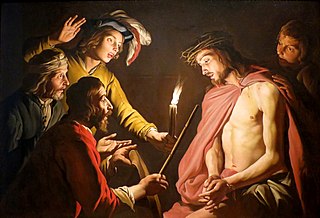
In Christianity, the Passion is the short final period before the death of Jesus Christ.

Yehoshua Sobol, is an Israeli playwright, writer, and theatre director.
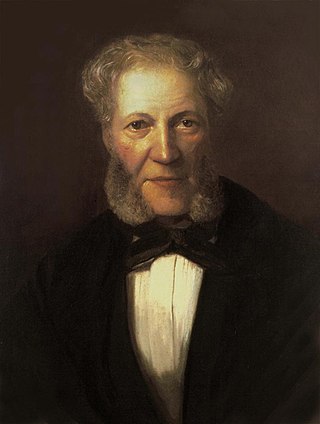
Isaac Ignaz Moscheles was a Bohemian piano virtuoso and composer. He was based initially in London and later at Leipzig, where he joined his friend and sometime pupil Felix Mendelssohn as professor of piano at the Conservatory.
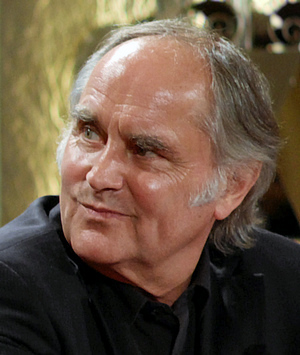
Michael Verhoeven is a German film director.
Maxim Biller is a German writer and columnist.

George Tabori was a Hungarian writer and theatre director.

The Burgtheater, originally known as K.K. Theater an der Burg, then until 1918 as the K.K. Hofburgtheater, is the national theater of Austria in Vienna. It is the most important German-language theater and one of the most important theatres in the world. The Burgtheater was opened in 1741 and has become known as "die Burg" by the Viennese population; its theater company has created a traditional style and speech typical of Burgtheater performances.
The biblical account of the crucifixion, death, and resurrection of Jesus (ʿĪsā) recorded in the Christian New Testament is rejected by most Muslims, but like Christians they believe that Jesus ascended to heaven and he will, according to Islamic literary sources, return before the end of time. The various sects of Islam have different views regarding this topic; traditionally, mainstream Muslims believe that Jesus was not crucified but was bodily raised up to heaven by God, while Ahmadi Muslims reject this belief and instead contend that Jesus survived the crucifixion, was taken off the cross alive and continued to preach in India until his natural death.

This is a glossary of terms used in Christianity.
Volker David Kirchner was a German composer and violist. After studies of violin and composition at the Peter Cornelius Conservatory, the Hochschule für Musik Köln and the Hochschule für Musik Detmold, he worked for decades as a violist in the Radio-Sinfonie-Orchester Frankfurt. He was simultaneously the violist in the Kehr Trio founded by his violin teacher Günter Kehr, and a composer of incidental music at the Hessisches Staatstheater Wiesbaden.
Jewish deicide is the notion that the Jews as a people were collectively responsible for the killing of Jesus. A Biblical justification for the charge of Jewish deicide is derived from Matthew 27:24–25. Some rabbinical authorities, such as Maimonides and, more recently, Zvi Yehuda Kook have asserted that Jesus was indeed stoned and hanged after being sentenced to death in a rabbinical court.
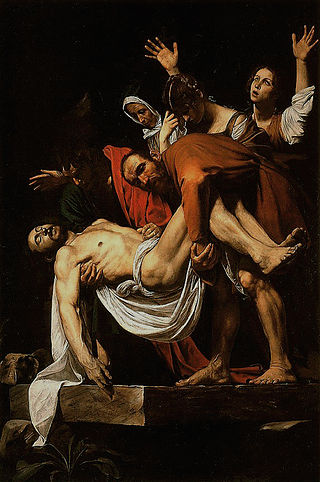
The burial of Jesus refers to the entombment of the body of Jesus after crucifixion, before the eve of the sabbath described in the New Testament. According to the canonical gospel narratives, he was placed in a tomb by a councillor of the Sanhedrin named Joseph of Arimathea; according to Acts 13:28–29, he was laid in a tomb by "the council as a whole." In art, it is often called the Entombment of Christ.
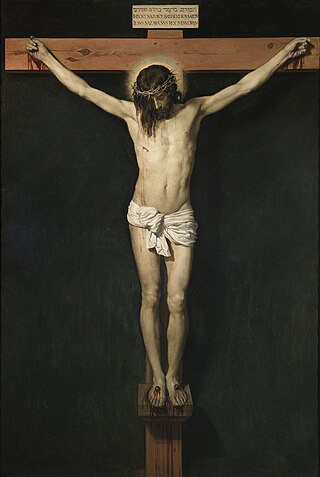
The crucifixion and death of Jesus occurred in 1st-century Judea, most likely in 30 CE or 33 CE. It is described in the four canonical gospels, referred to in the New Testament epistles, attested to by other ancient sources, and considered an established historical event. There is no consensus among historians on the details.

Gert Voss was a German actor. He was known for his roles in Labyrinth of Lies (2014), Sometime in August (2009) and Ritter, Dene, Voss (1987). He was member of the ensemble of the Burgtheater, and a Kammerschauspieler.
Stanley Walden is an American composer, musical performer, and professor of musical theater. He has written music for the theater in America and Europe, as well as for the concert stage. He has also been a clarinetist, actor and director. He is perhaps best known for writing music and lyrics of the revue Oh! Calcutta! He has also written a number of song cycles.

Ignaz Kirchner was a German actor who made a career on German-speaking stages, especially at Vienna's Burgtheater where he played for 30 years. A character actor, he worked with leading stage directors. He often played opposite Gert Voss, both in classical drama such as Shakespeare's Antonio, with Voss as Shylock, and as Jago, with Voss as Othello, and especially in black comedies, such as Goldberg in Tabori's Die Goldberg-Variationen, and in Neil Simon's The Sunshine Boys, Beckett's Endspiel and Genet's Die Zofen. Kirchner and Voss were named Schauspielerpaar des Jahres twice, in 1992 and 1998.

Sakura-Variationen is a 2000 trio composition scored for saxophone, piano, and percussion by Helmut Lachenmann. It is written in the form of variations on a Japanese folk song about the cherry blossom called "Sakura Sakura". It was published by Breitkopf & Härtel. In 2008, Lachenmann expanded the work to Sakura mit Berliner Luft.
Abraham Feinberg was an American rabbi who lived much of his life in Canada. In his obituary, The New York Times declared about him: "He was always ready to march, lend his name or send a telegram if there was a protest for disarmament or for a treaty on a nuclear test ban, or against racism in South Africa, radical injustice in America and United States policy in Vietnam."














